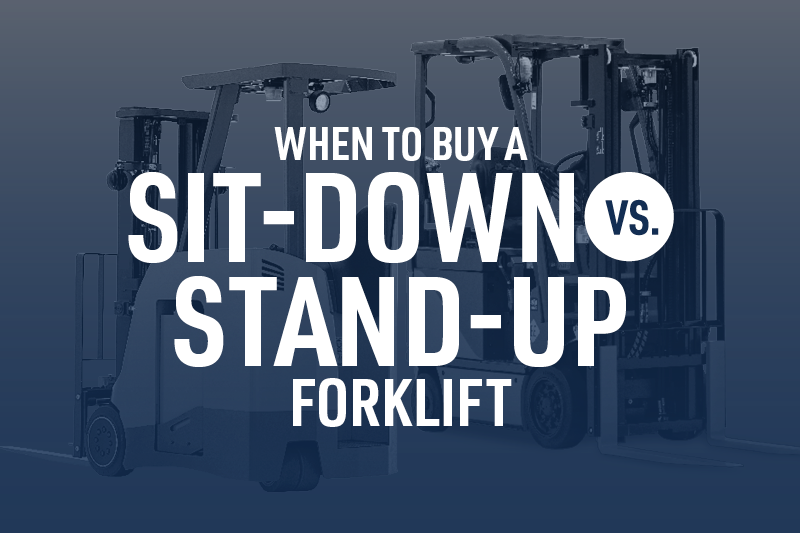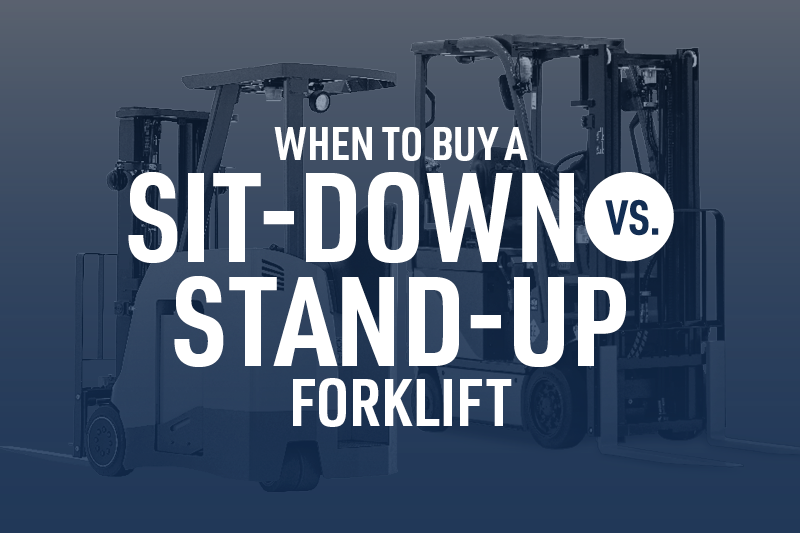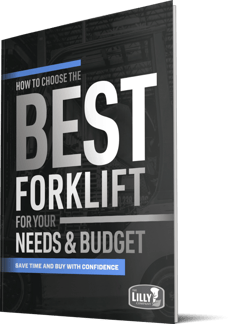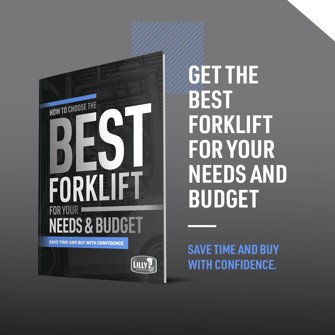

A stand-up forklift can deliver massive productivity gains and spike profits, but stand-up forklifts aren't the best choice for every application. In this article, we’ll explain the two most common reasons to buy a stand-up forklift and cover the pros and cons of stand-up versus sit-down forklifts. By the time you’re done reading, you’ll know which one is the best fit for your application.
Will your operation benefit from using a stand-up instead of a sit-down forklift? The answer comes down to two factors:
Factor #1 Operators get on and off the forklift frequently (to do something besides make an adjustment to the truck)
Improving operator productivity is one of the main reasons to use a stand-up forklift. It's surprising how much time an operator can spend transitioning on and off their forklift throughout the day. Consider this:
- To dismount from a sit-down forklift, the operator must apply the brake, unbuckle their safety belt and climb out of the truck. Then, when they’re ready to move again, the operator must repeat these steps in reverse. Even though this only takes 5-10 seconds, it can add up to a lot of wasted time.
- Stand-up forklifts eliminate all the steps described above. The operator simply steps out of the truck.
Important note: if the forklift operator gets in and out of the truck to reposition the forks or make other equipment adjustments, a fork positioner or sideshifter may be what you need, not a stand-up forklift. Learn more about forklift attachments.
Factor #2 The facility has very narrow aisles
Three-wheel sit-down forklifts can operate in aisles as narrow as 10 feet, but if your aisles are nine feet or narrower, you need a stand-up forklift.
Do You Need a Stand-Up Forklift, Reach Truck or Order Picker?
If one or both of the scenarios above describe your business, a stand-up forklift could be an excellent investment. Stand-up forklifts (also known as stand-on forklifts) come in a few different varieties:
- Stand-up Counterbalance (more commonly known as a "dock stocker")
- Reach trucks
- Order pickers
Our forklift experts can explain the difference between the three options above (if you’re not already familiar with them) and help you choose the best stand-up forklift for your operation. Contact us online or by phone (800-238-3006) to learn more.
Still unsure if you should buy a stand-up or sit-down forklift? Let’s take a closer look at the pros and cons of each one.
Pros and Cons of Stand-Up and Sit-Down Forklifts
Stand-up Forklift Pros
As mentioned above, stand-up forklifts are ideal for narrow aisles or any application where the operator frequently gets on and off the forklift. With a stand-up forklift:
- There’s no seatbelt to unbuckle (because the forklift doesn’t have a seat).
- A “deadman" pedal prevents the truck from moving (stand-up forklifts don't have a parking brake).
- The operator simply brings the forklift to a stop and steps out.
Dock stockers, reach trucks and order pickers can reduce repetitive use injuries because they provide better visibility. In a stand-up forklift, operators don’t have to strain their neck to drive in reverse because they stand sideways. Looking forward or backward down the aisle only requires a 45-degree turn of the head. Compare this to the 180-degree twist operators make when driving a sit-down forklift in reverse.
If your forklift operators drive in reverse 25+ percent of the time, a stand-up forklift can help them avoid back strain and repetitive use injuries.
Stand-up Forklift Cons
You’re probably wondering about the lifting capacity of stand-up forklifts. They have a smaller footprint, so they have limited capacity, right? Not exactly…
Stand-up forklifts generally have greater lifting capacity because of their center of gravity. That said, sit-down forklifts offer the greatest capacity overall.
What’s the max capacity for a stand-up forklift compared to sit-down forklifts?
- Depending on the model and manufacturer, the max capacity for a stand-up forklift is 4,000 - 4,500 lbs.
- The max capacity of a 3-wheel sit-down forklift is generally somewhere between 4,000 - 5,000 lbs.
- Most manufacturers of 4-wheel sit-down trucks max out capacity around 10,000-12,000 lbs. with a few exceptions.
The biggest drawback to buying a stand-up forklift may be the adjustment period for operators. Sit-down forklifts have a steering wheel and levers (not to mention a seat), but stand-up forklifts are controlled using a joystick. Our experienced forklift operator training team can help make the transition easier.
Sit-Down Forklift Pros
If your forklift operators make long runs, a sit-down forklift is the best choice. Standing up all day can cause considerable fatigue, and a comfortable operator is a productive operator.
High-volume operations should choose a sit-down over a stand-up forklift. Sit-down forklifts have faster travel speeds and faster lift/lower speeds compared to stand-up forklifts.
What if I have a high-volume operation with narrow aisles? A three-wheel sit-down forklift can navigate in 10-11’ aisles and is a good choice for high-volume operations and applications where the operator doesn’t need to get on or off the forklift frequently.
A few more reasons to choose a sit-down forklift include:
- Extra safety features
- If you need to use forklift attachment
- The truck will operate on slippery surfaces
Sit-Down Forklift Cons
We’ve covered most of the drawbacks to using a sit-down forklift earlier in this article. They include:
- Increased potential for back, neck and shoulder strain when traveling in reverse
- Extra time and effort to get on and off the forklift
- Can only be used in aisles 10+ feet wide
One additional drawback of a sit-down forklift is the possibility of decreased operator attentiveness. It’s important for operators to stay alert and focused, which comes more naturally when standing up vs. sitting down.
Forklift Buying Tips
We hope this article will help you make an informed decision about whether to buy a stand-up vs. sit-down forklift. If you have questions or would like additional information to help you gain buy-in from stakeholders and operators, let us know.
- We can also bring different forklift models to your location for a free demo.
- Or, try before you buy. We rent stand-up and sit-down forklifts.

The Lilly Company is an authorized forklift dealer for Toyota, Clark, Linde and Komatusu. Our experienced and friendly forklift experts serve customers throughout Alabama, Mississippi, Tennessee and eastern Arkansas.
If you’re new to buying a forklift, download our free guide: How to Choose the Best Forklift for Your Needs and Budget. It includes important questions to ask to ensure you don’t buy the wrong forklift and explains different forklift financing options.

Short on time? Just give us a call at 800-238-3006 or contact us online with any questions you may have. Or, come say hello at one of our 13 locations across the Mid-South:
Arkansas - Jonesboro
Alabama - Birmingham, Dothan, Irondale, Madison, Mobile, and Montgomery
Mississippi - Tupelo and Richland
Tennessee - Jackson, Kingsport, Knoxville, and Memphis
Further Reading:
Toyota’s EZ Control Forklift Joystick Puts You In Control
Clark OSQ Order Picker Product Review
How to Choose the Best Forklift for Your Work Environment
Know When It’s Time to Update Your Fleet
Posts by Tag
- Forklift (61)
- Forklift Service (19)
- Electric Forklifts (16)
- Forklift Safety (14)
- Forklift Attachments (12)
- Toyota Forklifts (12)
- Warehouse Planning (10)
- Parts (9)
- Warehouse Automation (8)
- Clark Forklifts (7)
- Loading Docks (7)
- Material Handling Education (7)
- Pallet Racking (7)
- Customer Solutions (6)
- Forklift Batteries (6)
- Forklift Rental (6)
- Purchasing Options (6)
- Aerial Equipment (5)
- Heavy Equipment (5)
- Forklift Accessories (4)
- Forklift Fleet Management (4)
- Forklift Tires (4)
- Forklift Training (4)
- Products (4)
- Utility Vehicles (4)
- Yard Spotter Trucks (4)
- Linde (3)
- Pallet Jacks (3)
- Specialty Forklifts (3)
- Used Equipment (3)
- IC Forklifts (2)
- Manitou (2)
- Warehouse Doors (2)
- COMBiLift (1)
- Custom Shop (1)
- Forklift Brakes (1)
- Forklift Warranty (1)
- Gehl (1)
- Komatsu (1)
- Product Review (1)
- Recruitment (1)











